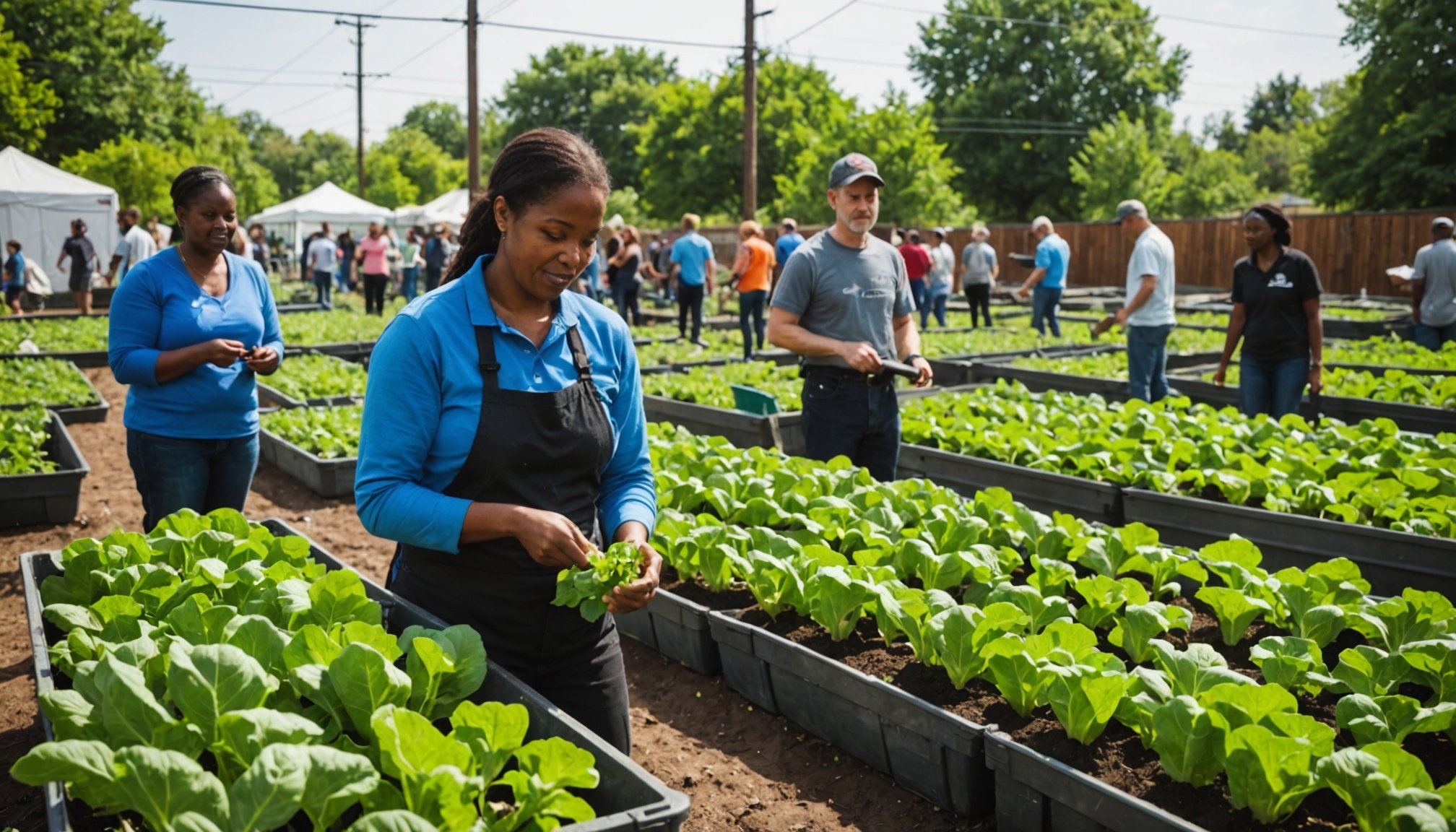Understanding Urban Farming and Mental Wellness
Urban farming, a revolutionary concept, transforms city spaces into vibrant agricultural zones. At its core, urban farming aims to produce food in limited spaces, providing fresh produce and reducing the carbon footprint associated with long-distance food transportation. These initiatives empower communities to become more self-sufficient, fostering a sense of empowerment and collaboration among residents.
The significance of mental wellness in today’s fast-paced world cannot be overstated. Mental wellness encompasses emotional, psychological, and social well-being, playing a crucial role in how individuals handle stress, make decisions, and relate to others. It’s a key component of community health, as the mental state of individuals collectively impacts the overall vibrancy and productivity of the community.
Also to read : Unlocking the Mind: How Learning a New Language Boosts Cognitive Function in Older Adults
Urban agriculture practices offer remarkable mental health benefits. By engaging in gardening and farming activities, individuals can experience reduced anxiety, improved mood, and enhanced cognitive function. The connection between nature and mental wellness is well-documented, and urban farming provides city dwellers with a vital link to nature.
Additionally, the communal aspect of urban farming fosters social connections and a shared sense of purpose, further boosting mental well-being. Involving oneself in such community health initiatives can lead to a rewarding experience, inviting individuals to partake in cultivating a healthier, happier urban environment.
Also read : Exploring the Impact of Reflexology on Post-Surgery Pain Relief for Cancer Patients: A Comprehensive Study
Case Studies of Successful Urban Farming Initiatives
Understanding how urban farming can influence communities requires examining urban farming success stories. Let’s explore some remarkable case studies that highlight their community impact.
Overview of Notable Programs
Several urban farming projects have successfully transformed local neighbourhoods. Programs like the Green Thumb Initiative and City Blooms have rallied community members to repurpose unused spaces for farming, providing fresh produce and educational opportunities. These programs serve as exemplary case studies, showcasing how urban farming can change a community’s landscape both physically and socially.
Measurement of Mental Health Outcomes
Participating in urban farming has shown positive effects on mental health. Through qualitative surveys and quantitative research, many case studies have demonstrated reduced stress levels and increased overall well-being among community gardeners. The act of nurturing plants promotes relaxation and mindfulness, offering significant psychological benefits. In these studies, participants frequently report feelings of accomplishment and community connection, underscoring the holistic benefits of urban farming.
Community Engagement Strategies
Effective community engagement strategies have played a vital role in the success of urban farming. Key approaches include hosting workshops, creating volunteer opportunities, and organising community events centred around gardening activities. By fostering an inclusive and educational environment, these strategies promote sustained community involvement and ensure that the benefits of urban farming are felt widely.
Personal Stories and Testimonials
Every urban farm has its roots in personal stories and transformative testimonials. These firsthand accounts provide insights into the lived experiences of urban farmers, illustrating the path from novice gardeners to seasoned cultivators. For many, participation in urban farming is not just about growing food; it’s a journey of empowerment and community bonding.
Take, for instance, the experience of Sarah, an urban farmer who transformed a neglected city lot into a thriving vegetable garden. Her testimonial highlights how the initiative fostered a sense of connection and sustainability within her community. “The soil has healed both our land and our lives,” Sarah remarks, capturing the essence of countless similar participant experiences.
Storytelling, thus, becomes a powerful tool in these initiatives. It communicates the values and benefits of urban farming to a broader audience, inspiring others to embrace and advocate for such practices. By sharing these narratives, urban farms not only support ecological health but also nurture human communities. Personal stories and testimonials serve as compelling evidence of the profound, positive impact that active participation in urban farming can generate, encouraging others to explore this rewarding path.
Research and Statistics on Urban Farming and Mental Health
Urban farming has emerged as a catalyst for enhancing mental health, with various research studies and statistics supporting this trend. Investigations have consistently illustrated a beneficial impact on individuals’ well-being when exposed to green environments.
Key Findings from Recent Studies
Recent research studies have revealed intriguing insights into the mental health benefits of urban farming. These studies show that individuals engaged in gardening or farming activities report lower levels of stress and anxiety. Furthermore, a notable increase in overall life satisfaction and self-esteem was observed among participants. Such activities promote mindfulness and provide a sense of accomplishment, serving as a therapeutic outlet.
Correlation between Green Spaces and Well-being
Statistics indicate a strong correlation between access to green spaces and improved mental health metrics. Urban farming offers an accessible means for city dwellers to interact with nature, thus contributing to emotional resilience. Studies have confirmed a reduction in depression levels amongst those who frequently visit or work in community gardens. Additionally, these environments encourage social interaction, further amplifying their positive psychological effects.
Quantitative Impact on Local Communities
Data shows significant improvements in community health metrics due to urban farming initiatives. Communities engaged in these practices display stronger social cohesion, reduced crime rates, and enhanced air quality. These factors collectively foster a healthier, more connected community environment, enriching both individual and collective well-being.
Implementing Urban Farming Programs
Urban farming is a dynamic, community-based venture with diverse implementation strategies. Starting a successful urban farming initiative requires careful planning and an understanding of the community’s needs. Identifying suitable land, understanding local regulations, and securing funding are essential steps. Effective implementation begins with aligning on a common goal that resonates with community values.
Community involvement plays a crucial role in such projects. Engaging residents from the start fosters a sense of ownership and commitment. Collaborative models, such as workshops and regular feedback sessions, encourage active participation and ensure that the farm reflects the community’s desires and needs. One popular model involves community members as co-creators and stakeholders, cultivating a shared vision.
Resources and support are pivotal for sustaining urban farms. Local governments often provide grants, land use assistance, and technical guidance. Non-profit organizations can offer expertise in urban farming techniques and community organizing. Building partnerships with local businesses can also supply necessary tools and resources.
In combining thoughtful implementation strategies and robust community engagement, urban farming initiatives can thrive, offering both environmental benefits and strengthening community ties.
Actionable Insights for Community Health Improvement
Delving into urban farming is not only fun but also an excellent way to foster community health. By harnessing actionable insights, individuals can effectively contribute to health improvement. Urban farming offers nutritious produce and encourages physical activity.
Tips for Individuals Interested in Urban Farming
For those eager to embark on their urban farming journey, start by identifying spaces suitable for planting. Whether it’s a rooftop or a balcony, every square meter helps. Equip yourself with knowledge about the best practices: soil quality, plant selection, and seasonal planting are critical components. This knowledge ensures not only successful crops but also sustained health benefits for your community.
Spotlight on Local Organizations
Engagement grows when local organizations are spotlighted. Seek out community gardens or groups dedicated to urban farming. These entities often offer workshops, tools, and resources, creating a support network that can significantly enhance your efforts. Collaborating with these organizations can also fortify community bonds and amplify collective health outcomes.
Planning for Sustainable Impact
Achieving a sustainable impact requires planning. Implement strategies like crop rotation and water conservation to enhance the long-term viability of urban farms. Continuous engagement with urban farming practices not only supports personal health choices but also strengthens community resilience by ensuring a steady supply of fresh produce.











